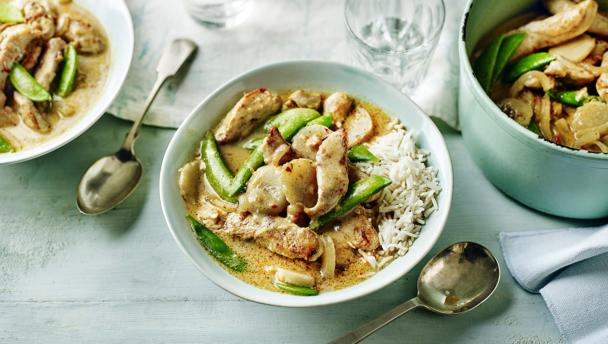
Preparation time
less than 30 mins
Cooking time
10 to 30 mins
Serves
Serves 8
This is an easy, foolproof Thai chicken curry recipe. The water chestnuts add a lovely crunch, but should be added at the end so they stay crisp.
Cut the chicken breasts in half and then into long thin slices. Tip into a bowl and add 1 tablespoon of the Thai curry paste, season with salt and freshly ground black pepper and mix.
Heat 1 tablespoon of the sunflower oil in a deep frying pan, add the chicken slices and fry over a high heat for 5 minutes until just cooked through – you may need to do this in batches. Transfer the cooked chicken slices to a plate.
Add the remaining oil to the pan and fry the onions for 3 minutes. Cover with a lid, lower the heat and cook for another 10 minutes to soften.
Increase the heat and add the ginger with the remaining Thai curry paste and fry for a minute. Sprinkle in the flour and blend in the coconut milk with the fish sauce and sugar, adding a little at a time. Stir the mixture and bring to the boil. Add the lemon grass and lime leaves and season with salt and freshly ground black pepper. Return the chicken to the pan, bring back up to the boil and then cover, reduce the heat and simmer for about 5 minutes, or until piping hot.
Meanwhile, cook the sugar snap peas in boiling salted water for 2 minutes, drain and refresh in cold water.
Remove the lemon grass and lime leaves from the curry and discard. Add the lime zest and juice, water chestnuts and sugar snap peas. Bring to the boil, then remove from the heat and serve with rice.
If covered and chilled in the fridge, you can make the curry up to a day ahead, adding the freshly cooked peas and water chestnuts just before serving.
Kept in a freezer proof container or bag, this dish freezes well without the sugar snap peas and water chestnuts; add these to the curry after reheating.
The flavour of lemon grass is wonderful, but the chopped stalk takes a long time to tenderise. I therefore like to bash it with a rolling pin before adding it to the curry – this allows all the flavours to be absorbed into the sauce.

By Jo' Pratt
See more thai chicken curry recipes (11)
Recipes from this episode